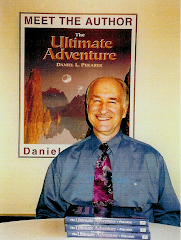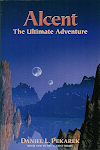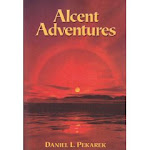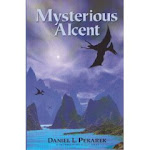INTRODUCTION
Dan Pekarek lives in Federal Way, Washington. He is the author of The Ultimate Adventure and Alcent Adventures, stories that have their origins in Dan’s childhood. As a youngster, Dan lived on the family farm in rural Minnesota. Away from city lights, the dark night sky revealed the natural beauty of the Universe and inspired Dan’s imagination. At age eleven, he became fascinated with Astronomy and dreamed about life on other planets. He started reading Aviation Week and Space Technology at age 13 and received a Bachelor’s degree in Aerospace Engineering in 1963. Dan has been reading Astronomy magazine since 1980 and has been a member of The Planetary Society since 1987. Needless to say, he is an enthusiastic supporter of space exploration.
Interviewer: What is The Ultimate Adventure?
Dan: It is a realistic story about the first people to leave Earth and go to another star.
Interviewer: Why would people want to go to another star?
Dan: In my story, an Earth-like planet is discovered orbiting Alpha Centauri A. Astronauts are sent there to explore the planet, study its life, and start a new civilization.
Interviewer: It seems to me that an Earth-like planet might have intelligent beings on it. Is it possible that they might object to the arrival of humans and try to defend their turf?
Dan: In The Ultimate Adventure, I created Alcent, a planet that is the way Earth might be if our dinosaur age had never ended. Here on Earth, the age of mammals came after the extinction of dinosaurs. If the dinosaurs hadn’t suffered this tragedy, we might not be here, so I didn’t put any intelligent humanoids on Alcent.
Interviewer: What about the dinosaurs, have any of them evolved intelligence?
Dan: That’s one of the questions that my interstellar pioneers have to answer when they arrive on Alcent.
Interviewer: Some of the dinosaurs that lived here on Earth were huge, ferocious hunters. It seems like Alcent would be a dangerous place to start a new civilization. Why would people want to go there and try to do that?
Dan: Humans are an adventurous species. Life-threatening danger has never stopped our pioneers from exploring the unknown. Going to the moon was hazardous, but we did it anyway. Space shuttle astronauts risk their lives every time they blast off, but despite that risk, they are building a manned space station. When that project is completed, people will return to the Moon, and we will go to Mars.
Interviewer: You’re very optimistic about the future of space exploration. Why?
Dan: Humans are a species with an undying curiosity. The thirst for new knowledge is always present. Also, there is the possibility of discovering life on other planets, especially, those orbiting Sun-like stars, like Alpha Centauri A.
Interviewer: When will we know if it has an Earth-like planet?
Dan: In just a few years, we’ll have the ability to detect Earth-sized planets orbiting other stars. So far, we’ve discovered more than 150 extra-solar planets, but they’re all much larger than Earth, some are even bigger than Jupiter. These planets are not good places to look for life as we know it, but we will find Earth-size planets.
Interviewer: Are you convinced that life as we know it exists elsewhere in the Universe?
Dan: Most definitely.
Interviewer: Why?
Dan: The Universe is huge, almost beyond imagination. It is made up of countless billions of galaxies. In just the Milky Way Galaxy, there are 200 billion stars. Four percent of them are Sun-like stars. That means there are eight billion Sun-like stars in our home galaxy. Even if only one percent of them have Earth-like planets, there would be 80 million planets for life as we know it to exist on. To me, it is totally illogical to think that life started only here.
Interviewer: You keep talking about Sun-like stars, why are they good places to look for life?
Dan: Sun-like stars are in a special class. They are friendly to life.
Interviewer: What makes the Sun so special when compared to other stars?
Dan: The Sun is hot enough and bright enough to give Earth a warm temperate climate. Also, it has been stable for several billion years. This is important because it took 4.6 billion years for life to begin on Earth and evolve to what we have today. Some stars are so big and hot that they burn up and go supernova in just a few hundred million years. That’s not enough time to evolve the kind of life we’re familiar with. On the other extreme, you have small red dwarfs that are too cool to support an Earth-like climate.
Interviewer: Just how much like the Sun is Alpha Centauri A? How friendly to life is it?
Dan: Alpha Centauri A is slightly bigger, brighter, and hotter than the Sun. But more important than these qualities, it is a little older than the Sun.
Interviewer: Why is age so important?
Dan: Earth is 4.6 billion years old. That’s how long it took for life to evolve to what we have today. Alpha Centauri A is believed to be about five billion years old.
Interviewer: So, the dinosaurs on Alcent are 400 million years more advanced than Earth’s dinosaurs were at the time of their extinction. With that much time, even the slow process of evolution can work miracles. What do these creatures evolve into? What kind of intelligence do they develop? How do they react to the arrival of humans bent on starting a new civilization on their planet?
Dan: Those are questions that Earth’s first interstellar pioneers have to deal with. But while finding answers, they attempt to establish a secure human colony that doesn’t upset the natural balance of life already on Alcent. In other words, they’re not allowed to plunder the buffalo, as was done in early America.
Interviewer: It sounds like they have a tough challenge.
Dan: They do, but they have plenty of advanced technology to work with.
Interviewer: I think I’ll read your book just to find out how your characters meet the challenge of staying alive.
Dan: Their life is a great adventure. You will enjoy the story.
Interviewer: I like The Ultimate Adventure’s cover design, but I have a question about the back cover image. It shows a second sunset. Does Alcent have more than one sun?
Dan: Three stars make up the Alpha Centauri system. They are Alpha Centauri A, Alpha Centauri B, and Alpha Centauri C. However, Alpha Centauri C is so far away from A and B that some astronomers question whether it is part of the system. Only A and B play a part in my story.
Interviewer: Tell me about the second sunset shown on the back cover.
Dan: People living on Alcent would experience the novelty of having two suns in the sky. There would be Alpha Centauri A shining in brilliant yellow and appearing very much like our Sun. And there would be the more distant Alpha Centauri B, an orange sun that would be quite dim because of its distance. However, it would be many times brighter than a full Moon. During part of the year, one of these suns would be rising when the other is setting, and it just simply would not get dark on Alcent. Also, Alpha Centauri B is an orange star and would tend to cast an eerie orange glow over the landscape.
In the image on the back cover, Alpha Centauri B is setting an hour-and-a-half after Alpha Centauri A. My interstellar pioneers are treated to this exotic scene at the end of their first day on Alcent. While the pioneers are enjoying this second sunset, a pair of pterodactyls arrive on the scene and perform aerial acrobatics. Apparently, these creatures are on a pleasure flight, but their fifty-foot wingspans silhouetted against the orange sky serves to let the pioneers know that they truly are on an alien planet filled with dangers.
Interviewer: What part do pterodactyls play in your story?
Dan: I can’t answer that without giving away part of the story.
Interviewer: How intelligent are they?
Dan: I can’t answer that either.
Interviewer: You’re evading my questions. Can you tell me anything?
Dan: I can tell you what is obvious. Pterodactyls are huge creatures that can fly. They can go anywhere, anytime. Any amount of intelligence on their part would make them very dangerous. As you know, they are predators.
Interviewer: That’s true, but would they prey on humans? Four hundred million years of evolution might have allowed them to develop the use of reason. Based on what they see the humans do, isn’t it possible that they might decide that there could be some benefits to being friendly with humans?
Dan: That’s possible, but I’m not going to comment on what happens in the story.
Interviewer: I sense that I’ve touched on a story element.
Dan: You have.
Interviewer: OK. What about Alpha Centauri B. Is it a Sun-like star?
Dan: It’s a little cooler than the Sun, but it could support an Earth-like planet if it were at about Venus distance away from it. The star is certainly old enough for life to have evolved on such a planet.
Interviewer: In your story, does Alpha Centauri B have a life-filled planet?
Dan: Yes, it does.
Interviewer: Does it have intelligent life?
Dan: On this planet, I put humanoids who have the technological ability that we had back in the eighties.
Interviewer: Do your pioneers get involved with them?
Dan: Yes.
Interviewer: In what way?
Dan: On this planet, there is a brutal planet-wide war bordering on genocide. My pioneers decide to find a way to end the madness. In the process, they risk their lives and make both friends and enemies. This happens before they arrive at Alcent.
Interviewer: Do the enemies made at Alpha Centauri B have the means to travel to Alcent, which orbits Alpha Centauri A?
Dan. That’s one of the questions the pioneers have to worry about.
Interviewer: I sense that your story is far more involved than just learning to live with dinosaurs.
Dan: It is a complex story with several interwoven elements. There is no end to mystery, drama, and adventure. Also, there is quite a bit of romance in the story, but that’s to be expected.
Interviewer. Why?
Dan: Half of the characters are men and half are women. Romantic involvement is a normal part of life. Besides that, romantic relationships add to the pleasure one gets from reading a novel.
Interviewer: What is the underlying theme in The Ultimate Adventure?
Dan: It is a positive, uplifting story. The characters are serious about their mission, but they believe that life is to be enjoyed, and they find ways to do that.
Interviewer: When did you get the idea for this story?
Dan: The idea for this story came from daydreams I had back in the fifties when I was a teenager.
Interviewer: I’m amazed that The Ultimate Adventure and Alcent Adventures could be the result of fantasies you had so long ago. To stick with you for so long, they must have been very exciting. How did they come about?
Dan: I grew up on the family farm back in central Minnesota. One of the jobs I enjoyed doing as a teenager was cultivating corn. Imagine sitting on a tractor all day long on a warm summer day. It was a pleasant experience, but as the days wore on, it always became quite monotonous. To deal with the monotony, I developed a vivid imagination. My mind was always taking me on imaginary adventures.
Interviewer: Tell me about the fantasies that led to your book.
Dan: There were two imaginary journeys that kept reoccurring, and they intrigued me to no end. I constantly pictured myself traveling back in time and visiting Earth during the peak of the dinosaur age. Also, I frequently made imaginary trips into space to explore planets teeming with life. In The Ultimate Adventure, I combined these fantasies and wrote a story about our first interstellar pioneers who go to a dinosaur dominated planet.
Interviewer: When did you start writing the story?
Dan: In the summer of 1989.
Interviewer: So you carried these fantasy adventures in your mind for more than 30 years before you started putting them down on paper.
Dan: That’s right.
Interviewer: Why did you wait so long?
Dan: I wasn’t sure that I had the talent to write a novel that people would enjoy reading. After all, I did get an incomplete on a 300-word theme paper when I was a freshman in high school. Try as I might, I was unable to come up with more than a hundred words.
Interviewer: You went from unable to write more than a hundred words to publishing a book with 269,000 words. That’s amazing!
Dan: When I think about, I am amazed too.
Interviewer: Well, what made you decide to take a shot at writing The Ultimate Adventure?
Dan: One day I was playing poker at Diamond Lil’s in Renton, Washington, and there was a guy in the game who was a real B. S. artist. Anyway, he announced to the players that he was writing a science fiction story. I stared at him in disbelief. I thought, if this clown can write a novel, I can write an even better one. In a matter of minutes, I cashed out, went home, sat down at my Panasonic word processor, and started writing.
Interviewer: He got you started, but it took you ten years to write the story. How did you stick with it for so long?
Dan: When I started creating the story, my teenage fantasies came to life. They became very real. The story took on a life of its own. Things seemed to just happen. Sometimes, I felt like I was reporting real events rather than writing a story. I felt like I was on a very real adventure. Even the characters became real people with minds of their own. At times, they even seemed to be telling me what to write. It was a phenomenal experience.
Interviewer: In other words, writing the story made it so real that you were able to mentally enjoy an adventure that’s not available in real life.
Dan: That’s true, and that is one of the greatest rewards of writing.
Interviewer: I think that’s also one of the greatest rewards of reading a good novel. Simply put, it is fun to escape to another time and place for a while.
Dan: Fun is something that was always on my mind when I wrote The Ultimate Adventure. I wanted the story to be realistic, but even more important than that, I wanted it to be exciting and fun to read. So I created positive-minded, fun-loving characters that people could enjoy reading about. It is my hope that some of my readers will be inspired by my characters to pursue their own dreams, make them happen, and enjoy the process. Life is meant to be enjoyed, and dreams are meant to be achieved.
Interviewer: I like that philosophy.
Dan: It has worked well for me.
Interviewer: What is Alcent Adventures?
Dan: It is the first sequel to The Ultimate adventure and is a continuation of the story. In Alcent Adventures, my characters discover that they are not alone on Alcent. Aliens from Delta Pavonis are stranded on Alcent because of problems with their starship. These aliens believe the earth people can help them, but they don’t trust the earth people. Alcent Adventures is a suspense filled thriller that readers have told me is difficult to put down.
Interviewer: Will there be a third book in the series?
Dan: Yes and I am planning to have it in bookstores by September, 2006.
Interviewer: Will there be additional books in the series?
Dan: My continuing story has taken on a life of its own. I have a vivid, creative imagination that just doesn’t want to quit, so I am going to let it go where it wants to go and enjoy the journey. By publishing my books, I am giving readers the opportunity to also enjoy the journey. All of my books have a book review form in the back, and I am receiving overwhelmingly positive feedback from readers. Needless to say, that is very gratifying to me.
Tuesday, July 7, 2009
Subscribe to:
Posts (Atom)



